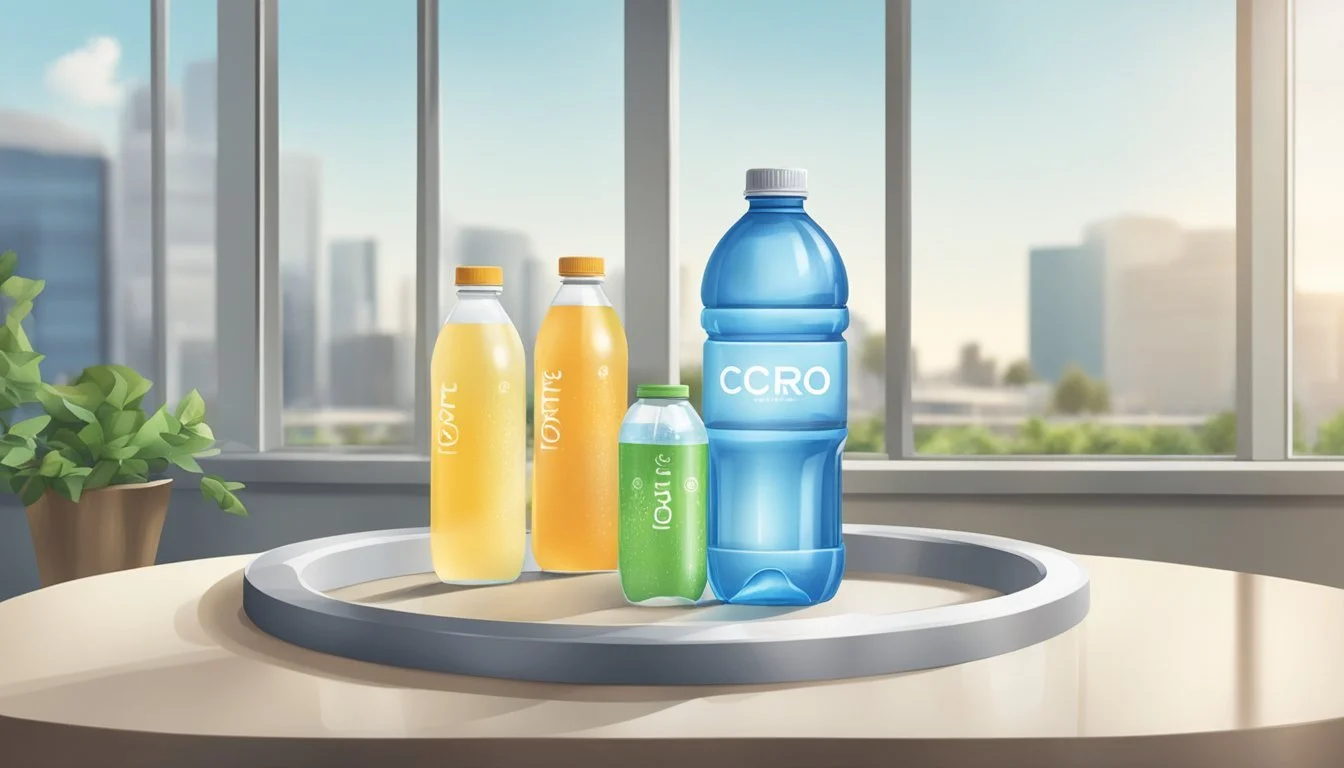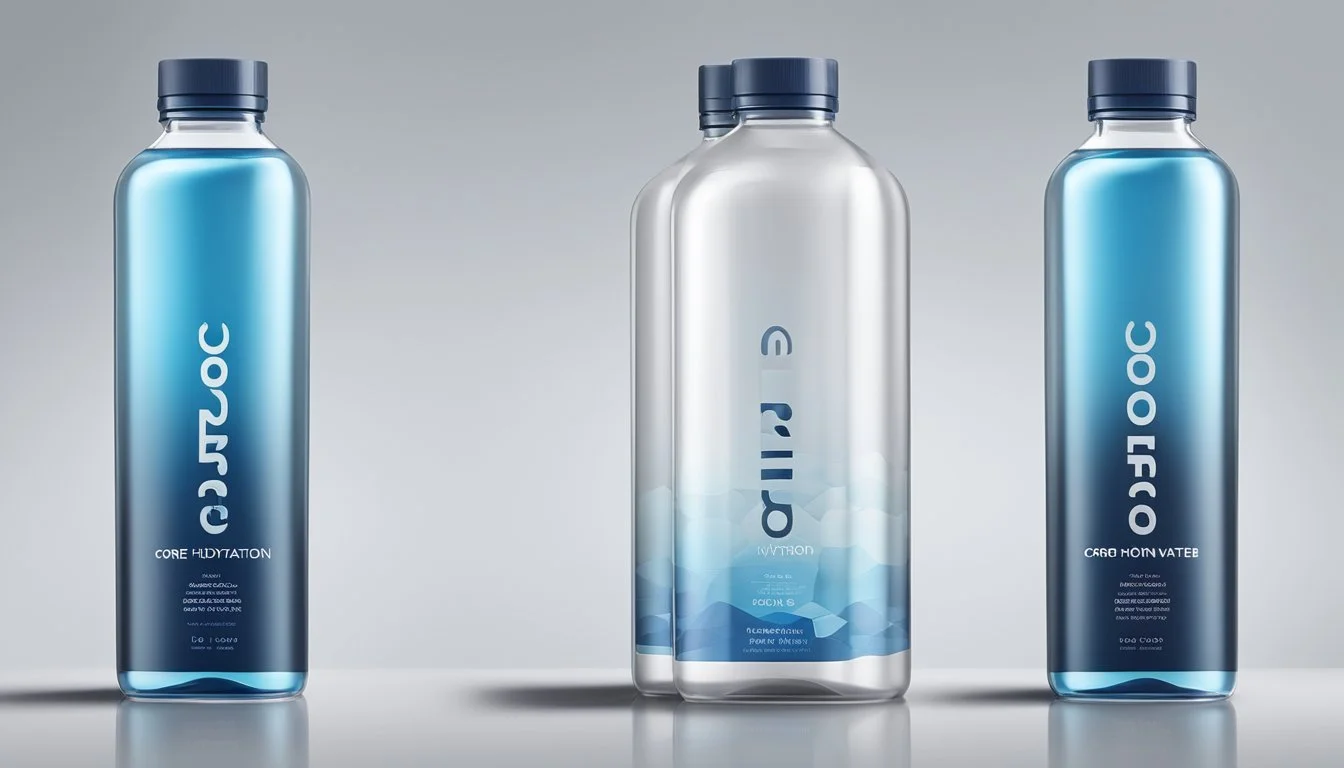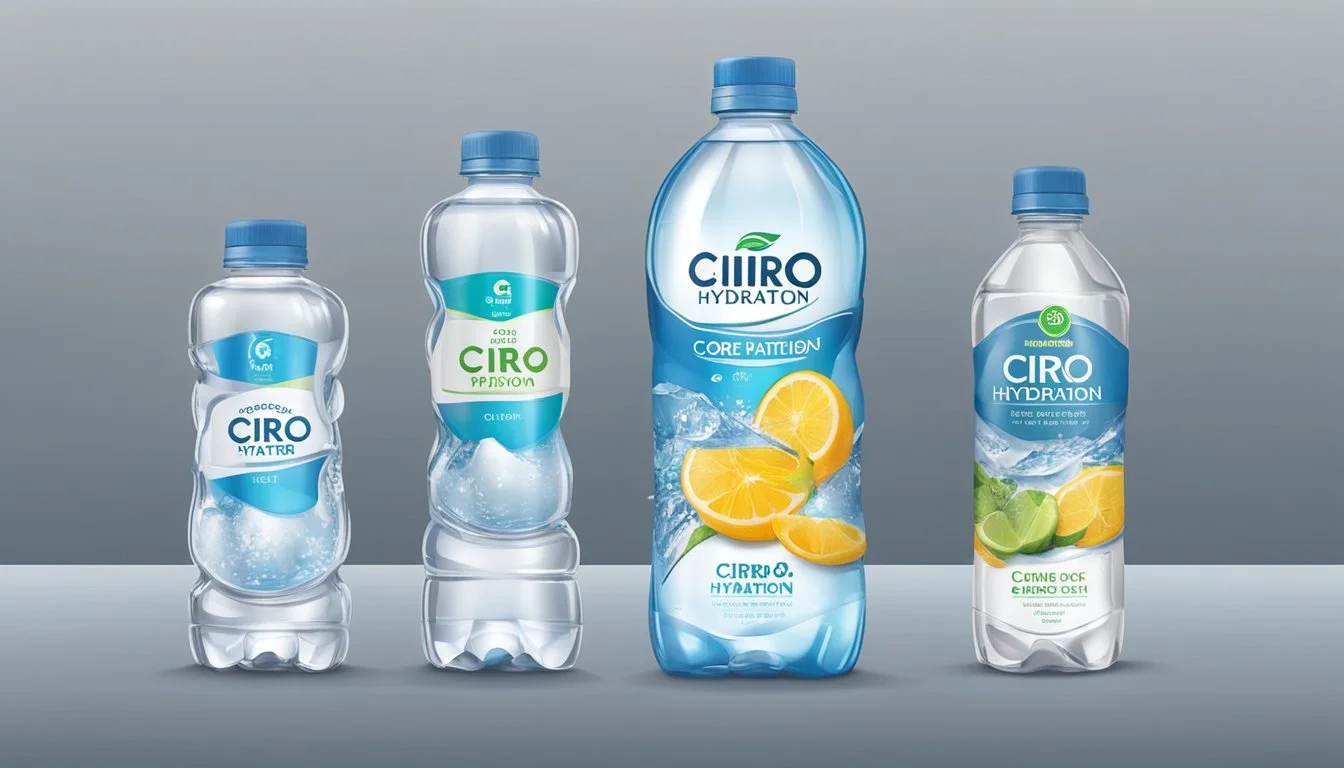Core Hydration vs. Cirro
Best Bottled Water Comparison
Choosing the right bottled water can be more than just a matter of taste; it can also be about health, purity, and sustainability. Core Hydration is marketed as a premium option with a unique selling point: its ultra-purified water matches the human body's natural pH level and includes electrolytes and minerals. Cirro, on the other hand, offers a more straightforward approach focusing on purity and hydration.
Core Hydration stands out with its design and added health benefits, making it a strong competitor in the bottled water market. It's packaged in 100% recyclable, BPA-free bottles, which cater to environmentally conscious consumers. Cirro is popular for its crisp, clean taste and commitment to purity, though it doesn't feature the added minerals and electrolytes found in Core Hydration.
Ultimately, the choice between Core Hydration and Cirro may come down to individual preferences and priorities. If optimal pH and extra nutrients are important, Core Hydration might be the better pick. If purity and taste are your main concerns, Cirro could be your go-to bottled water.
Bottled Water Overview
Bottled water has seen a significant rise in popularity, with consumption trends and environmental impacts becoming key discussion points. Comparing bottled water to tap water and considering the environmental ramifications of plastic bottle usage are central to this narrative.
The Rise of Bottled Water
Bottled water consumption has increased dramatically over the past few decades. Enhanced by marketing strategies that emphasize purity, convenience, and taste, many consumers favor bottled water over tap options. Brands like Core Hydration and Cirro leverage characteristics like pH balance and added electrolytes to attract health-conscious buyers.
This surge can also be linked to growing concerns about the safety and taste of local tap water. Consumers perceive bottled water as a more reliable source of clean, high-quality water, making it a staple in households, workplaces, and during travel. As a result, the bottled water market has diversified, offering various types including mineral, spring, and alkaline options.
Comparing Bottled and Tap Water
While bottled water is convenient, tap water often remains a safe and economical alternative. Municipal tap water is subject to rigorous testing and regulations. However, some consumers express concerns about contaminants, prompting a preference for bottled options.
Key Differences:
Cost: Bottled water is significantly more expensive per gallon than tap water.
Taste: Bottled water may have a different taste due to added minerals.
Regulation: Tap water is regulated by the EPA, while bottled water falls under FDA jurisdiction.
Consumers may prefer the taste and perceived purity of bottled water, but it's essential to recognize that tap water remains a viable and environmentally friendly option.
Environmental Considerations
The environmental impact of bottled water is a crucial issue. The production and disposal of plastic bottles contribute significantly to pollution and resource depletion. Although many bottles are recyclable, a substantial number end up in landfills or oceans.
Reducing plastic waste has become a priority for many brands. Core Hydration, for example, uses 100% recyclable and BPA-free plastic bottles, emphasizing sustainability. Despite these efforts, the energy and resources required to produce and transport bottled water continue to raise environmental concerns.
Key Environmental Issues:
Plastic Waste: Millions of plastic bottles are discarded daily.
Resource Use: Producing bottled water requires significant amounts of water and fossil fuels.
Recycling Challenges: Not all plastic bottles are recycled, compounding waste issues.
Understanding the environmental impact helps consumers make more informed choices about their water consumption.
Understanding Water Quality
Evaluating water quality involves analyzing elements like pH levels, mineral content, purification processes, and the presence of contaminants. These factors directly influence the health benefits and taste of bottled water.
pH Levels and Alkalinity
The pH level of water determines its acidity or alkalinity. Core Hydration water is balanced to a pH of 7.4, aligning closely with the body’s natural pH level. Cirro, on the other hand, offers both neutral and alkaline options. Alkaline water, typically with a pH above 7, can neutralize acid in the bloodstream. It's purported to help with issues like acid reflux.
While the body naturally regulates pH, consuming water closer to the body's natural level may contribute to overall hydration balance.
Electrolytes and Mineral Content
Electrolytes such as potassium, magnesium, and calcium are vital for maintaining body functions like muscle contraction and fluid balance. Core Hydration includes these electrolytes, which enhance flavor and hydration efficacy.
Cirro also provides water enriched with these minerals, ensuring that users get similar benefits. However, Core's specific combination of minerals, including magnesium and calcium chloride, is designed to optimize taste and hydration.
Purification Methods
Purification processes ensure the removal of harmful contaminants and improve taste. Core Hydration uses a proprietary technology that includes reverse osmosis, ensuring high purity. Cirro employs multiple filtration processes, including microfiltration and carbon filtration.
Both brands ensure that their water meets stringent purity standards, but the specific processes and technologies may influence purity and taste slightly differently.
Impact of Contaminants
Contaminants can adversely affect water quality. Core Hydration and Cirro both emphasize minimizing contaminants, employing rigorous testing. The presence of any contaminants, such as heavy metals or bacteria, is addressed through advanced purification methods.
By eliminating potentially harmful substances, both brands provide safer drinking options, making them suitable for health-conscious consumers. Comparing their contaminant elimination methods reveals a commitment to high water quality standards.
Analyzing Core Hydration
Core Hydration emphasizes a perfect pH balance and uses a comprehensive purification process to ensure ultra-purified water. The brand also touts the inclusion of electrolytes for optimal hydration and taste.
Production and Purification
Core Hydration uses a multi-step purification process to produce ultra-purified water. This process includes reverse osmosis, ultraviolet light, and ozone exposure. Reverse osmosis removes impurities and contaminants from the water, ensuring high purity. Ultraviolet light and ozone exposure are used to further purify and enhance the water's safety.
The water is then balanced to have a neutral to slightly alkaline pH level (around 7.4), which aligns with the body's natural pH balance. Core Hydration also adds a blend of electrolytes, such as potassium bicarbonate, magnesium chloride, and calcium chloride. These electrolytes enhance the flavor and support hydration, providing a refreshing drinking experience.
Profiling Cirro Water
Cirro Water is a premium bottled water brand known for its high-quality source and meticulous filtration process. The brand places a strong emphasis on the purity and taste of its water, catering to health-conscious individuals.
Source and Filtration
Cirro Water is sourced from natural springs, ensuring a pristine and uncontaminated origin. The water undergoes a multi-step filtration process, including microfiltration, reverse osmosis, and UV treatment.
This rigorous process removes impurities, ensuring the water is ultra-purified. The final product is free from contaminants, making it safe and healthy for daily consumption. The brand's dedication to maintaining high standards of cleanliness is evident in every bottle.
Taste and Purity
The meticulous filtration process of Cirro Water not only removes impurities but also enhances its taste. The water retains a crisp and clean flavor, appealing to those who prefer a natural and refreshing taste.
Free from added flavors or artificial ingredients, Cirro Water delivers a pure drinking experience. It's this dedication to both taste and purity that makes Cirro Water a standout choice among premium bottled water brands.
Health Implications
Examining Core Hydration and Cirro, we focus on their impact on health, hydration, electrolytes, and minerals present in these products.
Hydration and the Human Body
Hydration is crucial for bodily functions, including temperature regulation, digestion, and joint lubrication. Core Hydration claims its product supports the body's natural pH balance, enhancing hydration efficiency. Cirro promotes hydration with clean, purified water.
Adequate fluid intake helps maintain metabolic processes. Both brands provide essential water sources for daily hydration needs, which is vital for overall health.
Role of Electrolytes
Electrolytes play a pivotal role in maintaining fluid balance, muscle function, and nerve signaling. Core Hydration includes potassium bicarbonate, magnesium chloride, and calcium chloride, contributing to electrolyte balance.
While Cirro may not heavily advertise electrolytes, its purified water can still support overall hydration and mineral balance, albeit indirectly. Ensuring sufficient electrolyte intake, especially after sweat-heavy activities, is essential for optimal body function.
Minerals and Overall Wellness
Minerals such as magnesium, potassium, and calcium are fundamental for bone health, muscle contraction, and cardiovascular function. Core Hydration offers these minerals in small doses, enhancing its health benefits.
Cirro, focusing on pure water, may lack the added minerals found in Core Hydration. However, it remains a healthy hydration choice, particularly for those seeking a simple, clean water option. Both products support wellness differently, catering to diverse health preferences.
Environmental and Sustainability Concerns
Core Hydration and Cirro both aim to address environmental and sustainability concerns through their packaging materials and broader sustainability efforts.
Packaging and Plastic Use
Core Hydration uses 100% recyclable plastic bottles that are also BPA-free. The bottle design is ergonomic, allowing for a comfortable grip, which encourages reuse among consumers. The focus on recyclable materials contributes to reducing the overall environmental impact of their products.
Cirro, on the other hand, focuses on minimizing its carbon footprint by employing lightweight plastic for its bottles. This reduces the amount of plastic required and, consequently, the environmental impact of the packaging. The plastic used is also BPA-free and recyclable, aligning with Core's efforts to promote sustainability.
Sustainability Efforts
Core Hydration emphasizes an optimized pH level and added electrolytes for taste, which can be seen as part of their broader sustainability narrative. The brand ensures that its bottles are easily recyclable, contributing to a closed-loop system. The company also engages in campaigns to reduce plastic waste and promote recycling.
Cirro takes a different approach by offsetting its carbon emissions through various environmental projects. They invest in renewable energy and reforestation initiatives to mitigate the environmental impact of their manufacturing and distribution processes. Cirro's lightweight bottles not only use less plastic per unit but also reduce transportation emissions, enhancing the sustainability of their product lifecycle.
Taste Comparison
Core Hydration and Cirro both offer unique taste experiences driven by their respective mineral content and alkalinity. Consumers' personal preferences will ultimately guide their choice between the two brands.
Sensory Experience
Core Hydration features a pH-balanced formula that resonates with many consumers seeking a neutral taste. The water is slightly alkaline, with a pH near 7.4. This balance provides a smooth mouthfeel and subtle flavor that is neither too acidic nor overly mineralized.
Cirro, on the other hand, often emphasizes its crisp and clean taste. It is filtered to remove impurities but retains essential minerals. The taste can be described as refreshing with a slightly more pronounced mineral profile. The mouthfeel is generally light and invigorating, appealing to those who prefer a more distinct character.
The differences in alkalinity and mineral content between Core Hydration and Cirro lead to distinct sensory experiences. Core's approach to optimal pH balance aims for neutrality, whereas Cirro's focus on a crisp finish may appeal to those who enjoy a bit more flavor in their water.
Personal Preference in Taste
Personal taste preferences play a crucial role in choosing between Core Hydration and Cirro. Some individuals may favor Core's neutral and smooth profile, which works well with its slightly alkaline nature. This can be particularly appealing after a workout or during daily hydration, as it mimics the body's natural pH levels.
Conversely, Cirro's slightly more pronounced mineral content may attract those who appreciate a refreshing and distinctive taste. The crispness of Cirro can make it a preferred choice for those seeking a bit of character in their water without it being overwhelming.
In personal taste tests, preferences often vary. Some may find Core's subtlety ideal, while others might enjoy Cirro's lively finish. Personal hydration habits and desired taste profiles will largely determine the preference between these two brands.
Market Positioning of Bottled Water Brands
Leading bottled water brands differentiate themselves through unique selling propositions, encompassing purity, taste, and packaging. They cater to various consumer preferences from hydration needs to health-conscious choices.
Brand Comparison
Core Hydration and Cirro both position themselves as premium bottled water brands. Core Hydration emphasizes a seven-stage purification process, which includes reverse osmosis and the inclusion of electrolytes and minerals for better hydration. Cirro, while also marketed as a high-quality hydration option, targets eco-conscious consumers with its sustainable packaging.
Brands like Essentia and Smartwater highlight their advanced filtration techniques and added electrolytes. Fiji and Evian market their product based on natural artesian and spring sources, claiming a superior, naturally balanced mineral content.
Dasani and Aquafina, although positioned as more accessible options, still stress cleanliness and widespread availability. Premium offerings such as Voss and Icelandic Glacial underscore their water's origin and purity.
Consumer Perceptions
Consumer perceptions of bottled water brands are largely influenced by brand marketing, taste, and purity claims. Core Hydration is seen as a go-to for fitness enthusiasts due to its emphasis on hydration and mineral content. Cirro gains traction with eco-friendly consumers valuing its commitment to sustainable practices.
Smartwater and Essentia are often perceived as superior hydration options, appreciated for their clean taste and added electrolytes. Evian and Fiji command respect for their pure, natural sources, often viewed as luxurious choices.
Conversely, brands like Dasani and Aquafina enjoy broad popularity due to their affordability and trust in the name. Poland Spring and Deer Park are favored for regional familiarity and reliability. Premium brands like Voss and Icelandic Glacial cater to consumers seeking premium water experiences.
Price Analysis
Key aspects regarding the pricing of Core Hydration and Cirro include the cost of production and consumer pricing, providing a comprehensive look at financial considerations for consumers.
Cost of Production
Core Hydration focuses on producing water with added electrolytes and maintaining an optimal pH. The process involves purification, balancing pH to 7.4, and adding minerals. The ergonomically designed bottles are 100% recyclable and BPA-free, which could potentially increase production costs due to the materials and manufacturing processes involved.
Cirro, by contrast, may have varying production costs depending on its source and the processing requirements necessary to meet industry standards. Typically, brand-name recognition and sourcing quality can influence the overall production expenses. Additionally, if Cirro adopts sustainable packaging practices, as seen with some brands, this can similarly impact costs.
Consumer Pricing
In the market, Core Hydration tends to be priced as a premium product. This pricing reflects the brand’s emphasis on balanced pH and added electrolytes. The ergonomic design and attention to health-conscious details contribute to its pricing strategy, often positioning it higher than standard bottled water.
Cirro’s consumer pricing is contingent on its market position and branding. If positioned as an everyday bottled water, it might be priced competitively within the mid-range segment. However, if Cirro highlights unique sourcing or added health benefits, consumer prices may align with the higher end of the market, similar to Core Hydration.
Analyzing these factors gives consumers a clearer perception of what they are paying for with each brand and how the pricing aligns with production and market positioning.






